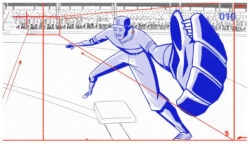I’ve been working in the field of motion design for 11 years. As a woman of non-Caucasian ethnicity, I’m definitely a minority in the field.
Sometimes, I think I’ve had a fortunate run. True, I don’t have any boastful awards to speak of, but I’m not poor, I’ve got a list of happy clients and good-looking projects under my belt, and I’m more or less content with life/work balance. This doesn’t mean things have been easy, and like any other women in the field, I am a ‘survivor’, so to speak.
So on that note, I want to start a conversation by sharing some tips that have helped me survive as a woman in what is undeniably still a male-dominated industry.
5 Survival Tips for Women in Motion Design
01: Don’t use weak language
I first came across this article titled ‘Do You Sabotage Yourself By Using Weak Language?’ a couple of years ago. Ever since then, I have been as careful as possible not to do so.
Eliminating phrases like “I would just…” or “I may not be an expert in this, but…” takes real effort in the beginning. I was nervous that I would come across as rude, but my worries were unfounded. I discovered that by sounding surer of myself, I reduced the overall stress of the situation, for everybody.
As a leader, your team finds it far less stressful when you know what you want, as it’s a lot easier to communicate and follow your directions. As a team member, it’s less likely others will discount your opinion — which helps shift people’s mindset that women are less capable than men.
02: Call them up for being sexist — but never lose your temper
This is very difficult to do, but it is also very important. A well-phrased response delivered calmly is going to cause more impact than an angry rant. You also don’t end up damaging your credibility and professionalism.
When someone says something derogatory, insulting or sexist to you, try to simply say, “That’s terribly sexist and inappropriate,” before simply walking away from the situation. I’ve lost my temper once or twice, and I’m not always great at this, but it gets easier with practise.
03: Find fellow feminists (male and female) and build your support network
Related to no. 02, sometimes the only way to stay sane is to vent. Get your friends around for a drink, and vent to your heart’s content, after which (hopefully) you’re ready to face another day.
04: Look at the positives
Venting alone isn’t always enough. Sometimes, you need to keep reminding yourself of good things that come out of your minority status. As friends have pointed out, women motion designers are rare, so people tend to remember you more.
Secondly, there is a silver lining to this cloud of sexism. It’s easier to separate the good from the bad amongst your male colleagues and friends. Men who don’t dismiss your troubles, who will stand up for you, who are open to criticism, and who support gender equality: they’re keepers. The rest, well, we only hope they’ll learn in time. Things can only get better from here on.
Just as we gasp in horror at blatant sexism on display in period shows like Mad Men or Downton Abbey, someday our grandkids will look back on today and wonder how we could be so uncivilised.
05: Don’t measure yourself by their standard
Motion design, like any other creative field, still primarily measures success through the award system: Young Guns, Promax, D&AD, and so on. Awards are not necessarily bad, but they’re just one way of looking at achievement and career fulfillment.
Personally, I feel that the vertical structure (where a career fulfillment is achieved by climbing higher and higher, both in terms of monetary awards, position, prestige, or otherwise) is a very male way of measuring things. Women tend to prefer a more spherical model, where life and work balance is perhaps one of the most important things to strive for.
Child-bearing figures hugely into this equation. I look at female friends with newborns or young children who also juggle careers in animation and motion design and wonder where’s the award for them?
When I was younger, I too wanted to climb higher and higher. But as I get older, I realize that by keeping my eyes peeled on the gold star, I miss all the other stuff that is just as (if not more) important. Such as the joy in the creative process itself, the possibility to experiment with something new. A client who’s willing to take risks with you, and who pays you on time. All these keep me grounded, realistic, and confident I won’t miss the forest for the trees, so to speak.
These are some of my favourite survival tips. What are yours? Do share!




